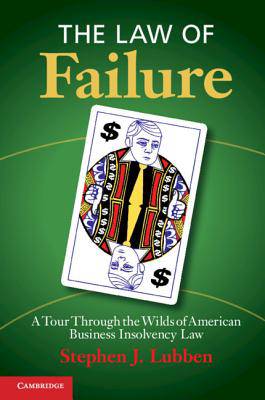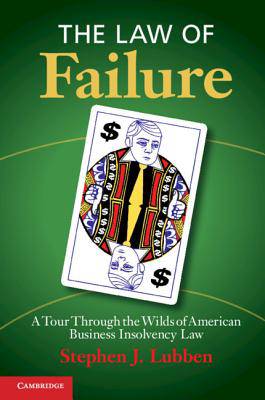
Door een staking bij bpost kan je online bestelling op dit moment iets langer onderweg zijn dan voorzien. Dringend iets nodig? Onze winkels ontvangen jou met open armen!
- Afhalen na 1 uur in een winkel met voorraad
- Gratis thuislevering in België vanaf € 30
- Ruim aanbod met 7 miljoen producten
Door een staking bij bpost kan je online bestelling op dit moment iets langer onderweg zijn dan voorzien. Dringend iets nodig? Onze winkels ontvangen jou met open armen!
- Afhalen na 1 uur in een winkel met voorraad
- Gratis thuislevering in België vanaf € 30
- Ruim aanbod met 7 miljoen producten
Zoeken
The Law of Failure
A Tour Through the Wilds of American Business Insolvency Law
Stephen J Lubben
Paperback | Engels
€ 67,95
+ 135 punten
Uitvoering
Omschrijving
If a broker-dealer liquidates in federal bankruptcy court, why does an insurance company liquidate in state court, and a bank outside of court altogether? Why do some businesses re-organize under state law 'assignments', rather than the more well-known Chapter 11 of the Bankruptcy Code? Why do some laws use the language of bankruptcy but without advancing policy goals of the Bankruptcy Code? In this illuminating work, Stephen J. Lubben tackles these questions and many others related to the collective law of business insolvency in the United States. In the first book of its kind, Lubben notes the broad similarities between the many insolvency systems in the United States while describing the fundamental differences lurking therein. By considering the whole sweep of these laws - running the gamut from Chapter 11 to obscure receivership provisions of the National Bank Act - readers will acquire a fundamental understanding of the 'law of failure'.
Specificaties
Betrokkenen
- Auteur(s):
- Uitgeverij:
Inhoud
- Aantal bladzijden:
- 192
- Taal:
- Engels
Eigenschappen
- Productcode (EAN):
- 9781316640418
- Verschijningsdatum:
- 16/08/2018
- Uitvoering:
- Paperback
- Formaat:
- Trade paperback (VS)
- Afmetingen:
- 154 mm x 228 mm
- Gewicht:
- 281 g

Alleen bij Standaard Boekhandel
+ 135 punten op je klantenkaart van Standaard Boekhandel
Beoordelingen
We publiceren alleen reviews die voldoen aan de voorwaarden voor reviews. Bekijk onze voorwaarden voor reviews.











